338 books about Knowledge and 13
start with N
338 books about Knowledge and 13
338 books about Knowledge
13 start with N start with N
13 start with N start with N
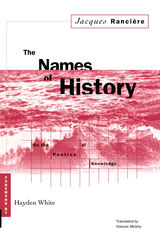
Names Of History
On the Poetics of Knowledge
Jacques Ranciere
University of Minnesota Press, 1994
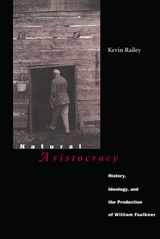
Natural Aristocracy
History, Ideology, and the Production of William Faulkner
Kevin Railey
University of Alabama Press, 1999
Kevin Railey uses a materialist critical approach--which envisions literature as a discourse necessarily interactive with other forces in the world--to identify and historicize Faulkner’s authorial identity. Working from the assumption that Faulkner was deeply affected by the sociohistorical forces that surrounded his life, Railey explores the interrelationships between American history and Faulkner’s fiction, between southern history and Faulkner’s subjectivity. Railey argues that Faulkner’s obsession with history and his struggle with specific ideologies affecting southern society and his family guided his development as an artist, influencing and overdetermining characterizations and narrative structures as well as the social vision manifest in his work. By seeing Faulkner the artist and Faulkner the man as one and the same, Railey concludes that the celebrated author wrote himself into history in a way that satisfied the image he had of himself as a natural, artistic aristocrat, based on the notion of natural aristocracy.
After examining two prevailing and opposing ideologies in the South of Faulkner’s lifetime--paternalism and liberalism--Railey shows how Faulkner’s working-through of his identifications with these forces helped develop his values and perceptions as an artist and individual. Railey reads Faulkner’s fiction as exploring social concerns about the demise of paternalism, questions of leadership within liberalism, and doubts about both an aristocracy of heritage and one of wealth. This reading of The Sound and the Fury, As I Lay Dying, Sanctuary, Light in August, Absalom, Absalom!, the Snopes trilogy and The Reivers details Faulkner’s explorations of various manifestations of paternalism and liberalism and the intense conflict between them, as well as his attempts to resolve that conflict.
Providing new insights into the full range of Faulkner’s fiction, Natural Aristocracy is the first systematic materialist critique of the author and his world.
[more]
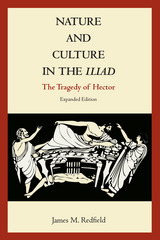
Nature and Culture in the Iliad
The Tragedy of Hector
James M. Redfield
Duke University Press, 1994
By focusing on the story of Hector, James M. Redfield presents an imaginative perspective not only on the Iliad but also on the whole of Homeric culture. In an expansive discussion informed by a reinterpretation of Aristotle's Poetics and a reflection on the human meaning of narrative art, the analysis of Hector leads to an inquiry into the fundamental features of Homeric culture and of culture generally in its relation to nature. Through Hector, as the "true tragic hero of the poem," the events and themes of the Iliad are understood and the function of tragedy within culture is examined. Redfield's work represents a significant application of anthropological perspectives to Homeric poetry. Originally published in 1975 (University of Chicago Press), this revised edition includes a new preface and concluding chapter by the author.
[more]
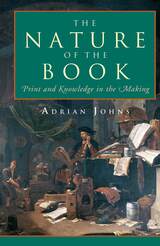
The Nature of the Book
Print and Knowledge in the Making
Adrian Johns
University of Chicago Press, 1998
In The Nature of the Book, a tour de force of cultural history, Adrian Johns constructs an entirely original and vivid picture of print culture and its many arenas—commercial, intellectual, political, and individual.
"A compelling exposition of how authors, printers, booksellers and readers competed for power over the printed page. . . . The richness of Mr. Johns's book lies in the splendid detail he has collected to describe the world of books in the first two centuries after the printing press arrived in England."—Alberto Manguel, Washington Times
"[A] mammoth and stimulating account of the place of print in the history of knowledge. . . . Johns has written a tremendously learned primer."—D. Graham Burnett, New Republic
"A detailed, engrossing, and genuinely eye-opening account of the formative stages of the print culture. . . . This is scholarship at its best."—Merle Rubin, Christian Science Monitor
"The most lucid and persuasive account of the new kind of knowledge produced by print. . . . A work to rank alongside McLuhan."—John Sutherland, The Independent
"Entertainingly written. . . . The most comprehensive account available . . . well documented and engaging."—Ian Maclean, Times Literary Supplement
"A compelling exposition of how authors, printers, booksellers and readers competed for power over the printed page. . . . The richness of Mr. Johns's book lies in the splendid detail he has collected to describe the world of books in the first two centuries after the printing press arrived in England."—Alberto Manguel, Washington Times
"[A] mammoth and stimulating account of the place of print in the history of knowledge. . . . Johns has written a tremendously learned primer."—D. Graham Burnett, New Republic
"A detailed, engrossing, and genuinely eye-opening account of the formative stages of the print culture. . . . This is scholarship at its best."—Merle Rubin, Christian Science Monitor
"The most lucid and persuasive account of the new kind of knowledge produced by print. . . . A work to rank alongside McLuhan."—John Sutherland, The Independent
"Entertainingly written. . . . The most comprehensive account available . . . well documented and engaging."—Ian Maclean, Times Literary Supplement
[more]
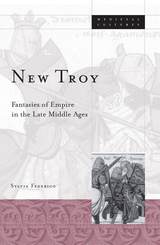
New Troy
Fantasies Of Empire In The Late Middle Ages
Sylvia Federico
University of Minnesota Press, 2003
Examines the political and literary uses of the Trojan legend in the medieval period.
England in the late fourteenth century witnessed a large-scale social revolt, a lingering and seemingly hopeless war with France, and fierce factional conflicts in royal politics and London civic government--struggles in which all parties sought to justify their actions by claiming historical precedent. How the Trojan legend figured in these claims--and in competing assertions of authorial legitimacy, nationhood, and rule in the later Middle Ages--is the complex nexus of history, myth, literature, and identity that Sylvia Federico explores in this ambitious book.
During the late medieval period, many European political and social groups took great pains to associate themselves with the ancient city; the claim on Troy, Federico asserts, was crucial to nationhood and was always a political act. Her book examines the poetry and prose of several late medieval authors, focusing particularly on how Chaucer's use of the Trojan legend helped to set the terms by which the Ricardian and Lancastrian periods were distinguished, and further helped to establish English literary history as a noble precedent in its own right. Federico's book affords remarkable insight into the workings of the medieval historical imagination.
Sylvia Federico has taught at Washington State University and the University of Leeds. She currently lives in Maine.
[more]
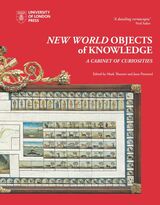
New World Objects of Knowledge
A Cabinet of Curiosities
Edited by Mark Thurner and Juan Pimentel
University of London Press, 2021
A stunning, richly illustrated hardback cataloging key artifacts from across Latin American art, nature, and history.
From the late fifteenth century to the present day, countless explorers, conquerors, and other agents of empire have laid siege to the New World, plundering and pilfering its most precious artifacts and treasures. Today, these natural and cultural products—which are key to conceptualizing a history of Latin America—are scattered in museums around the world.
With contributions from a renowned set of scholars, New World Objects of Knowledge delves into the hidden histories of forty of the New World’s most iconic artifacts, from the Inca mummy to Darwin’s hummingbirds. This volume is richly illustrated with photos and sketches from the archives and museums hosting these objects. Each artifact is accompanied by a comprehensive essay covering its dynamic, often global, history and itinerary. This volume will be an indispensable catalog of New World objects and how they have helped shape our modern world.
From the late fifteenth century to the present day, countless explorers, conquerors, and other agents of empire have laid siege to the New World, plundering and pilfering its most precious artifacts and treasures. Today, these natural and cultural products—which are key to conceptualizing a history of Latin America—are scattered in museums around the world.
With contributions from a renowned set of scholars, New World Objects of Knowledge delves into the hidden histories of forty of the New World’s most iconic artifacts, from the Inca mummy to Darwin’s hummingbirds. This volume is richly illustrated with photos and sketches from the archives and museums hosting these objects. Each artifact is accompanied by a comprehensive essay covering its dynamic, often global, history and itinerary. This volume will be an indispensable catalog of New World objects and how they have helped shape our modern world.
[more]
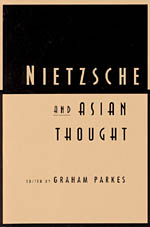
Nietzsche and Asian Thought
Edited by Graham Parkes
University of Chicago Press, 1991
Friedrich Nietzsche's work has had a significant impact on the intellectual life of non-Western cultures and elicited responses from important thinkers outside of the Anglo-American philosophical traditions as well. Bringing together thirteen internationally renowned scholars, this is the first collection of essays to address the connection between Nietzsche's ideas and philosphies in India, China, and Japan.
The contributors are Roger T. Ames, Johann Figl, Chen Guying, Michel Hulin, Arifuku Kogaku, David A. Kelly, Glen T. Martin, Sonoda Muneto, Graham Parkes, okochi Ryogi, Eberhard Scheiffele, Mervyn Sprung, and Joan Stambaugh.
"Exemplary. Its comparative approach is incisive yet accessible. I consider it a 'must read'"—Kathleen Marie Higgins, Philosophy East and West
"An excellent introduction to the broad ranging reception of Nietzsche among Asian thinkers."—James R. Watson, Canadian Philosophical Review
"The essays in this welcome collection are invariably thought-provoking and genuinely cross-disciplinary."—Kenneth Surin, Religious Studies Review
"A worthy and undogmatic introduction to several fascinating questions concerning the relations between Nietzschean thought and certain traditions of thought in India, China, and Japan."—Don Miller, Asian Studies Review
The contributors are Roger T. Ames, Johann Figl, Chen Guying, Michel Hulin, Arifuku Kogaku, David A. Kelly, Glen T. Martin, Sonoda Muneto, Graham Parkes, okochi Ryogi, Eberhard Scheiffele, Mervyn Sprung, and Joan Stambaugh.
"Exemplary. Its comparative approach is incisive yet accessible. I consider it a 'must read'"—Kathleen Marie Higgins, Philosophy East and West
"An excellent introduction to the broad ranging reception of Nietzsche among Asian thinkers."—James R. Watson, Canadian Philosophical Review
"The essays in this welcome collection are invariably thought-provoking and genuinely cross-disciplinary."—Kenneth Surin, Religious Studies Review
"A worthy and undogmatic introduction to several fascinating questions concerning the relations between Nietzschean thought and certain traditions of thought in India, China, and Japan."—Don Miller, Asian Studies Review
[more]
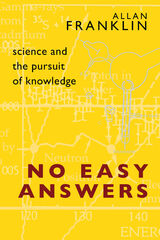
No Easy Answers
Science and the Pursuit of Knowledge
Allan Franklin
University of Pittsburgh Press, 2007
In No Easy Answers, Allan Franklin offers an accurate picture of science to both a general reader and to scholars in the humanities and social sciences who may not have any background in physics. Through the examination of nontechnical case studies, he illustrates the various roles that experiment plays in science. He uses examples of unquestioned success, such as the discoveries of the electron and of three types of neutrino, as well as studies that were dead ends, wrong turns, or just plain mistakes, such as the “fifth force,” a proposed modification of Newton's law of gravity. Franklin argues that science is a reasonable enterprise that provides us with knowledge of the natural world based on valid experimental evidence and reasoned and critical discussion, and he makes clear that it behooves all of us to understand how it works.
[more]

No God but Man
On Race, Knowledge, and Terrorism
Atiya Husain
Duke University Press, 2025

No Man's Garden
Thoreau And A New Vision For Civilization And Nature
Daniel B Botkin
Island Press, 2001
In No Man's Garden, ecologist Daniel Botkin takes a fresh look at the life and writings of Henry David Thoreau to discover a model for reconciling the conflict between nature and civilization that lies at the heart of our environmental problems. He offers an insightful reinterpretation of Thoreau, drawing a surprising picture of the “hermit of Walden” as a man who loved wildness, but who found it in the woods and swamps on the outskirts of town as easily as in the remote forests of Maine, and who firmly believed in the value and importance of human beings and civilization.Botkin integrates into the familiar image of Thoreau, the solitary seeker, other, equally important aspects of his personality and career -- as a first-rate ecologist whose close, long-term observation of his surroundings shows the value of using a scientific approach, as an engineer who was comfortable working out technical problems in his father's pencil factory, and as someone who was deeply concerned about the spiritual importance of nature to people.This new view of one of the founding fathers of American environmental thought lays the groundwork for an innovative approach to solving environmental problems. Botkin argues that the topics typically thought of as “environmental,” and the issues and concerns of “environmentalism,” are in fact rooted in some of humanity's deepest concerns -- our fundamental physical and spiritual connection with nature, and the mutually beneficial ways that society and nature can persist together. He makes the case that by understanding the true scientific, philosophical, and spiritual bases of environmental positions we will be able to develop a means of preserving the health of our biosphere that simultaneously allows for the further growth and development of civilization.No Man's Garden presents a vital challenge to the assumptions and conventional wisdom of environmentalism, and will be must reading for anyone interested in developing a deeper understanding of interactions between humans and nature.
[more]
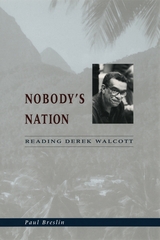
Nobody's Nation
Reading Derek Walcott
Paul Breslin
University of Chicago Press, 2001
Nobody's Nation offers an illuminating look at the St. Lucian, Nobel-Prize-winning writer, Derek Walcott, and grounds his work firmly in the context of West Indian history. Paul Breslin argues that Walcott's poems and plays are bound up with an effort to re-imagine West Indian society since its emergence from colonial rule, its ill-fated attempt at political unity, and its subsequent dispersal into tiny nation-states.
According to Breslin, Walcott's work is centrally concerned with the West Indies' imputed absence from history and lack of cohesive national identity or cultural tradition. Walcott sees this lack not as impoverishment but as an open space for creation. In his poems and plays, West Indian history becomes a realm of necessity, something to be confronted, contested, and remade through literature. What is most vexed and inspired in Walcott's work can be traced to this quixotic struggle.
Linking extensive archival research and new interviews with Walcott himself to detailed critical readings of major works, Nobody's Nation will take its place as the definitive study of the poet.
According to Breslin, Walcott's work is centrally concerned with the West Indies' imputed absence from history and lack of cohesive national identity or cultural tradition. Walcott sees this lack not as impoverishment but as an open space for creation. In his poems and plays, West Indian history becomes a realm of necessity, something to be confronted, contested, and remade through literature. What is most vexed and inspired in Walcott's work can be traced to this quixotic struggle.
Linking extensive archival research and new interviews with Walcott himself to detailed critical readings of major works, Nobody's Nation will take its place as the definitive study of the poet.
[more]
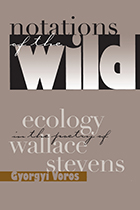
Notations Of The Wild
Ecology Poetry Wallace Stevens
Gyorgyi Voros
University of Iowa Press, 1997
In the summer of 1903, just before he turned twenty-four, Wallace Stevens joined a six-week hunting expedition to the wilderness of British Columbia. The adventure profoundly influenced his conceptions of language and silence, his symbolic geography, and his sensibilities toward wild nature as nonhuman “other.” The rugged western mountains came to represent that promontory of experience—“green's green apogee”—against which Stevens would measure the reality of all his later perceptions and conceptions and by which he would judge the purpose and value of works of the human imagination. Notations of the Wild views his poetry as a radical reimagining of the nature/culture dialectic and a reinstatement of its forgotten term—Nature.
Gyorgyi Voros focuses on three governing metaphors in Stevens' poems—Nature as house, Nature as body, and Nature as self. She argues that Stevens' youthful wilderness experience yielded his primary subject—the relationship between human beings and nonhuman nature—and that it spurred his shift from a romantic to a phenomenological understanding of nature. Most important, it prompted him to reject his culture's narrow humanism in favor of a singular vision that in today's terms would he deemed ecological.
Gyorgyi Voros focuses on three governing metaphors in Stevens' poems—Nature as house, Nature as body, and Nature as self. She argues that Stevens' youthful wilderness experience yielded his primary subject—the relationship between human beings and nonhuman nature—and that it spurred his shift from a romantic to a phenomenological understanding of nature. Most important, it prompted him to reject his culture's narrow humanism in favor of a singular vision that in today's terms would he deemed ecological.
[more]

Notorious Identity
Materializing the Subject in Shakespeare
Linda Charnes
Harvard University Press, 1993
Richard III, Troilus and Cressida, Antony and Cleopatra—these were figures of intense signification long before Shakespeare took up the task of giving them new life on the stage. And when he did, Linda Charnes argues, he used these legendary figures to explore a new kind of fame—notorious identity—an infamy based not on the moral and ethical “use value” of legend but on a commodification of identity itself: one that must be understood in the context of early modern England’s emergent capitalism and its conditions of economic, textual, theatrical, and cultural reproduction. Ranging across cultural materialism, new historicism, feminist psychoanalysis, cultural anthropology, deconstruction, and theories of postmodernity, the author practices a “theory without organs”—which she provocatively calls a constructive “New Hystericism”—retheorizing the discourses of reigning methodologies as much as those in Shakespeare’s plays.
[more]
READERS
Browse our collection.
PUBLISHERS
See BiblioVault's publisher services.
STUDENT SERVICES
Files for college accessibility offices.
UChicago Accessibility Resources
home | accessibility | search | about | contact us
BiblioVault ® 2001 - 2024
The University of Chicago Press









